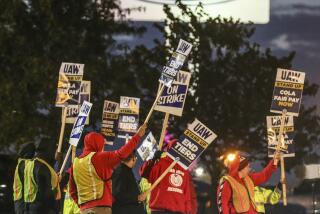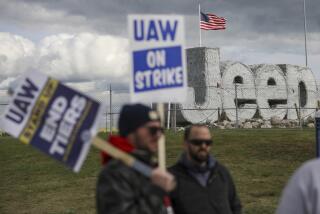DETROIT AND THE MISSION TO JAPAN : Politics Is Stealing the Show : Auto industry: As the Motor City gears up for its annual car exhibition, U.S.-Japan trade tensions dominate the scene.
DETROIT — Noise from the auto industry will hit new decibel levels this week, but it won’t be the throaty engine roar that organizers of the Detroit or Los Angeles auto shows could identify with.
Much of the racket will be the grinding of metal against metal on the stage of U.S.-Japanese politics in Tokyo, where the chairmen of the three beleaguered U.S. auto firms arrive today for a potentially acrimonious visit with President Bush and leaders of Japan.
The progress of their controversial trade mission will be closely watched here, not merely for its economic implications but for clues as to whether Detroit’s three most powerful people will all return home by Friday night.
That’s the date for a Motor City ritual: the charity preview for its annual auto show. It is a black-tie affair where the heads of General Motors, Ford and Chrysler--and lesser lights from the foreign-owned auto makers--stroll among the four-wheeled exotica at a downtown convention hall while TV cameras relay the proceedings live to viewers as far away as Flint.
Auto shows aren’t what they used to be: the main place to sell cars. In 1904, half the nation’s vehicle output was sold in a week at the National Automobile Show in Madison Square Garden. Still, today’s iterations are a useful arena for local dealers to whip up interest in cars during the winter doldrums.
But this year has an atmosphere of its own. While the auto-show circuit cranks up as usual--it started Saturday at the Los Angeles Convention Center, to be followed this week in Detroit and later Chicago--the extravaganzas are something of a sideshow to the real-life agonies of the auto industry shakeout.
U.S. auto makers, thought to have lost a combined $4.5 billion last year, are the main props in this week’s White House mission to redress the trade imbalance with Japan and fix up the economy in a presidential election year. As they push their glitzy wares at the auto shows, car peddlers will be keeping one eye on Japan and talking yen, dollars and trade deficits.
“It’s a little ironic that we have these big shows in L.A. and Detroit while Bush and everybody is over there. But we hope they come back with some good news,” says Rod Alberts of the Detroit Auto Dealers Assn.
Just what would constitute good news will be hotly debated in Detroit in conjunction with the auto show, which is a magnet for all sorts of players.
While the likes of Lexus, Porsche and Pontiac are doing handstands for 2,000 reporters from 25 countries today, a daylong conference of the Society of Automotive Analysts will feature leading federal auto regulators, top Wall Street analysts and reputed Japan-basher Rep. John Dingell (D-Mich.), the powerful congressman from Detroit.
In addition to trade policy, Dingell will talk about “how convenient it is to bash Detroit,” an aide says. A cheerier topic on the agenda: “The Coming Automotive Boom.”
Another alleged Japan-basher, Chrysler boss Lee A. Iacocca, will skip a state dinner in Tokyo so he can get home in time to make a major address Thursday to the Detroit Economic Club. The topic is not decided, but the voluble Iacocca’s speech writer is traveling with him, and “I’m sure he’ll be scribbling furiously all the way back,” an aide says.
And Sunday, GM Chairman Robert C. Stempel, who last month signed death notices for 21 factories and 74,000 jobs, will be back to put his own spin on the events in Tokyo in the keynote speech for another auto show event here, the weeklong World Automotive Congress sponsored by the trade publication Automotive News.
(If Stempel were returning earlier, Detroit’s auto scene might also have been visited this week by workers and politicians from Arlington, Tex., whose GM assembly plant is threatened with closure. Local leaders hope to plead their case in person, “but it wouldn’t be very productive without Mr. Stempel there,” Mayor Richard Greene says.)
As for the actual auto show at Detroit’s Cobo Hall, says Chrysler spokesman Steve Harris, “we have some spectacular things planned if anybody’s around to watch.”
Attendance is figured to be up from last year, when the televised Persian Gulf War kept people home. But this year’s charity preview will likely attract far fewer than in 1991, chiefly because ticket prices have been practically doubled to $250 a couple to keep out the riffraff.
The auto moguls can afford that, even if their companies cannot, and organizers dare to hope that all three car missionaries will make it back from Tokyo in time. It’s a rare U.S. auto chieftain who misses the event, which a U.S. executive at a Japanese-owned auto firm characterizes as “the strut of the peacocks.”






